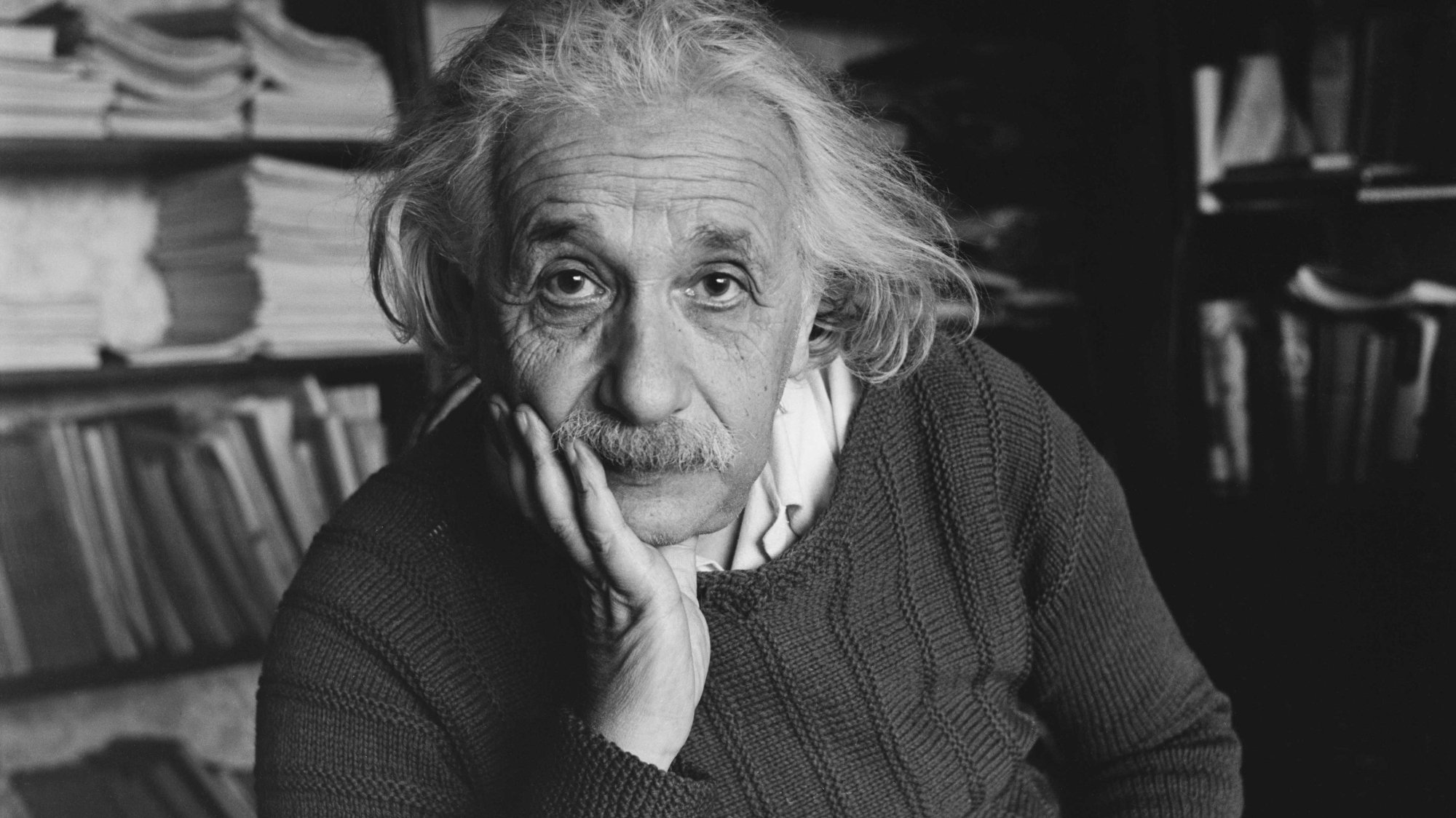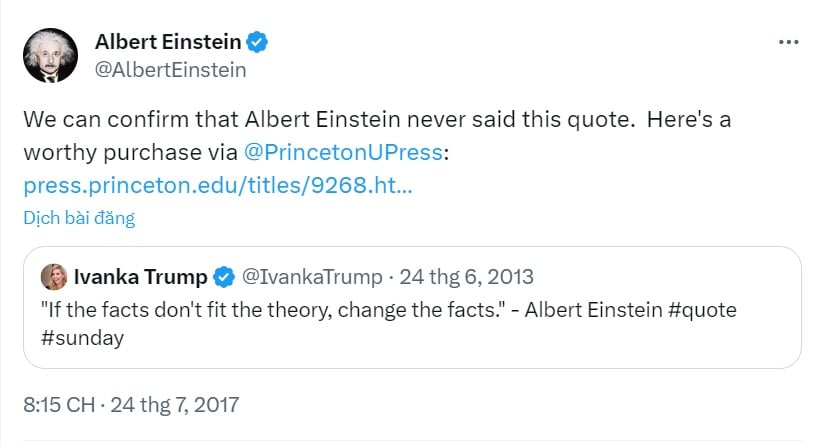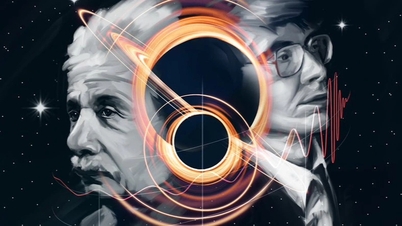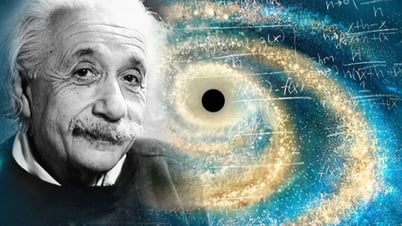The problem is that only when the world entered the digital age, the age of social media, did this "bad habit" become truly serious and alarming on a global scale.
When even "Figures of the Century" are slandered and misrepresented.
A decade ago, Ivanka Trump quoted the genius Albert Einstein, saying, "If reality doesn't match theory, change reality." However, the fact is that the greatest scientist of the 20th century never actually said that. Few paid attention to that tweet until Einstein himself, seemingly "returned from the dead," corrected her.

Albert Einstein was once the target of misinformation in the past. Photo: GI
Obviously, Einstein couldn't have come back to life to post that tweet nearly a decade ago; rather, it was the verified Albert Einstein account, with 20 million followers managed by a group of scholars who admire him, that refuted the claim made by the daughter of former US President Donald Trump.
In fact, Einstein was often the target of misinformation during his time, much like what is prevalent on social media. In 1920, scientists considered Einstein an eccentric. Their criticisms were often anti-Semitic. In that era, information spread relatively slowly, with its reach often limited by geography or language.
The scientist Einstein was annoyed by all these problems. But out of curiosity, he attended an event protesting the theory of relativity in Berlin, where he saw anti-Einstein leaflets being distributed. No one knew he was there. This amused him, that those protesting him couldn't recognize him.
Thus, from ancient times to the present day, there have always been those who want to distort everything, to slander or even falsely accuse someone or something to satisfy their selfish ego, even though they know nothing about the things they are vilifying, as in the case of Einstein mentioned above. They didn't even know what he looked like! And now, in the digital age, the age of social media, everyone knows how terrible this problem is.
Matthew Stanley, a historian of science and philosophy of science at New York University and author of a book about past slanders and misinformation about Einstein, once shared: “He thought these people weren’t really that dangerous because they were so stupid and so ignorant of relativity. He thought it was all a bit ridiculous.” Perhaps we should also consider those who slander, distort, and spread rumors about us or others on social media as simply “ridiculous” or “stupid.”
Returning to Einstein's story. By 1933, when the Nazis came to power, two forms of misinformation about Einstein were circulating much more openly and widely: One was the assertion that his theory of relativity was completely wrong, a “great threat to the foundations of human knowledge.” The other misinformation was that Einstein had stolen ideas from other German and Austrian scientists. Like other prominent Jews, Einstein was considered an enemy of the Nazis, and it was rumored that he was wanted everywhere.
But the truth is that Einstein received an enthusiastic welcome wherever he went. Carolyn Abraham, author of the book "Possessing Genius," writes that reporters would rush onto his ship whenever it docked, so much so that some fell overboard. For the last two decades of his life, he was one of the most respected public figures in the world. Time magazine named him "Person of the Century" in 1999.
"Seeking the truth is a noble human virtue."
However, refuting misinformation and fake news used to be much easier than it is now. More specifically, the consensus around central figures, the acknowledgment of an intellectual genius like Einstein, is no longer seen in the modern world. We no longer gather around the television in the evenings to watch the news. Now, we are drawn to digital platforms where news is shared by individuals and influencers on TikTok give us advice, manipulating our psychology about everything.
It's now widely known that even the "greatest" person in the world, like Einstein for example, would inevitably face baseless and derogatory comments on social media. As a result, people's trust is dwindling. We are experiencing a profound lack of trust in everyone, from politicians and celebrities to social media influencers.
Einstein taught that time is relative, depending on your frame of reference. Could it be that truth itself has become relative? Einstein is not only a symbol of humanity's supreme intelligence, but in today's polarized world, it sometimes seems he might be the last expert we can all agree on, even though he passed away more than two-thirds of a century ago (1955).
The internet has given us online movies and the ability to stay in touch with friends far away, but it has also spawned news feeds overflowing with misinformation, conspiracy theories, and fabricated scientific evidence.

The tweet (now labeled X) from the Albert Einstein account refutes Ivanka Trump's false claims. Photo: X/Twitter
Those who refuse to vote and those who oppose vaccination can now easily find like-minded people in the world of social media, further amplifying those views. They campaign, express extreme opinions, and sometimes they win.
What would Einstein, who was driven throughout his life by a curiosity to uncover the truth about our universe, think of the misinformation crisis that social media has helped to create? He certainly wouldn't be comfortable with the countless pieces of false information and inflammatory comments, nor with the many people who are now claiming to be experts in every field.
If Einstein were still alive, he, famous for his witty remarks, might post a concise tweet in response to those who deny science and blindly adhere to flat-earth ideology. That tweet might read: “The pursuit of truth and knowledge is one of the finest human virtues. Though it is often most loudly proclaimed by the least ambitious.”
Yes, Einstein actually said that!
Hoang Viet
Source





![[Photo] Prime Minister Pham Minh Chinh presides over a meeting on private sector economic development.](/_next/image?url=https%3A%2F%2Fvphoto.vietnam.vn%2Fthumb%2F1200x675%2Fvietnam%2Fresource%2FIMAGE%2F2025%2F12%2F20%2F1766237501876_thiet-ke-chua-co-ten-40-png.webp&w=3840&q=75)






































































































Comment (0)